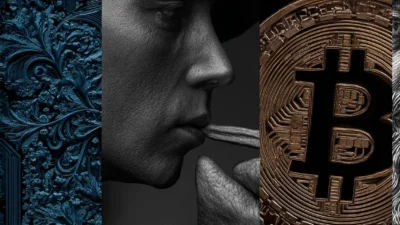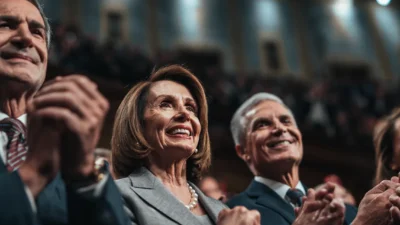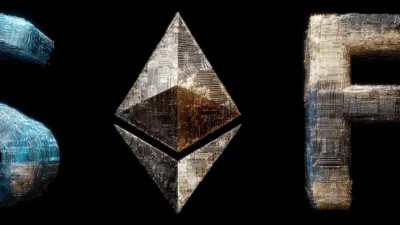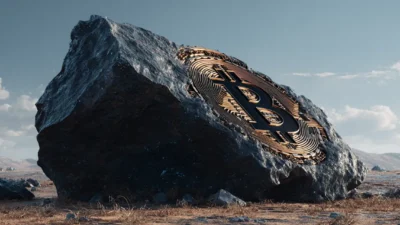TLDR
- The GENIUS Act is a stablecoin bill that has been cruising through Congress.
- Several democrats, some previously supporting the bill, have changed their minds.
- One of the most notable 180-degree turns has been Senator Ruben Gallego from Arizona.
Hey. This is crypto. Most of us have gotten so used to surprises that nothing surprises us anymore. It’s always just “another day in the life”. But…today’s story made us raise an eyebrow.
A group of Senate Democrats, previously supportive of crypto-friendly legislation, announced their opposition to the current version of the GOP-led stablecoin bill on Saturday. If you’re a newcomer to blockchain or dabbling in digital assets, here’s the lowdown on what’s happening, why it matters, and what’s next. Let’s get after it.
What’s the Stablecoin Bill All About?
First, let’s get on the same page. Stablecoins are digital tokens pegged to real-world assets like the U.S. dollar. They’re designed to reduce volatility in the crypto market, making them a popular choice for transactions and bridging traditional finance with blockchain tech. So, we aren’t talking about Bitcoin or Ethereum here.
The proposed legislation, championed by Senator Bill Hagerty (R-Tenn.), aims to establish the first U.S. regulatory framework for stablecoins. This is one of two stablecoin bills going through Congress right now, with the other being the STABLE Act.
Approval of the bill could open doors for the crypto industry, offering legitimacy and potential for growth by setting clear rules for stablecoin issuers. Think of it as the official “rulebook” the industry has wanted for years.
The Plot Twist
It’s a weird scenario. We first heard about it this weekend. But at the time, it seemed to be conjecture, as we couldn’t dig up any real information other than information that started with “according to a source close to the matter”.
So we let it be. But today is Monday, and it turns out this news is true. The initial report came from an X page, and we couldn’t verify authenticity by press time, although it appeared to have Senator Gallego’s letterhead at the top.
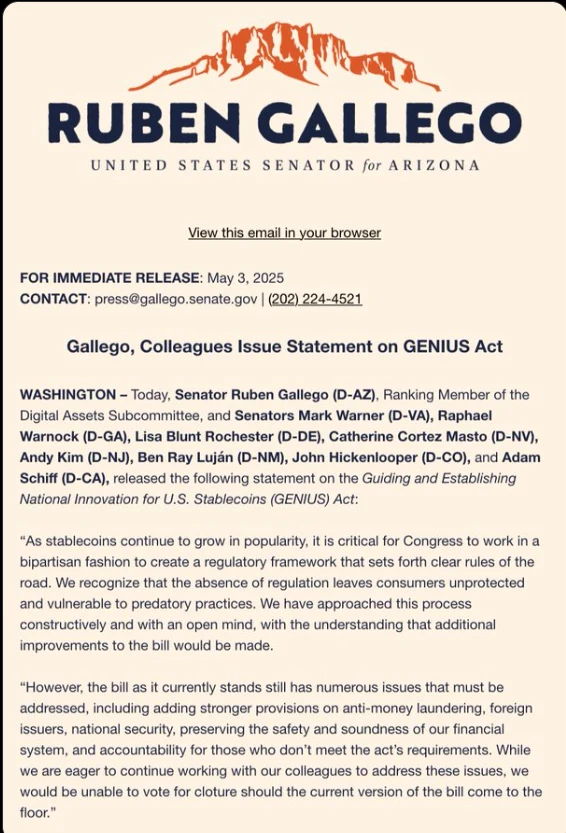
To us, this seemed really odd. Why? Because back in March, the same senator said this:
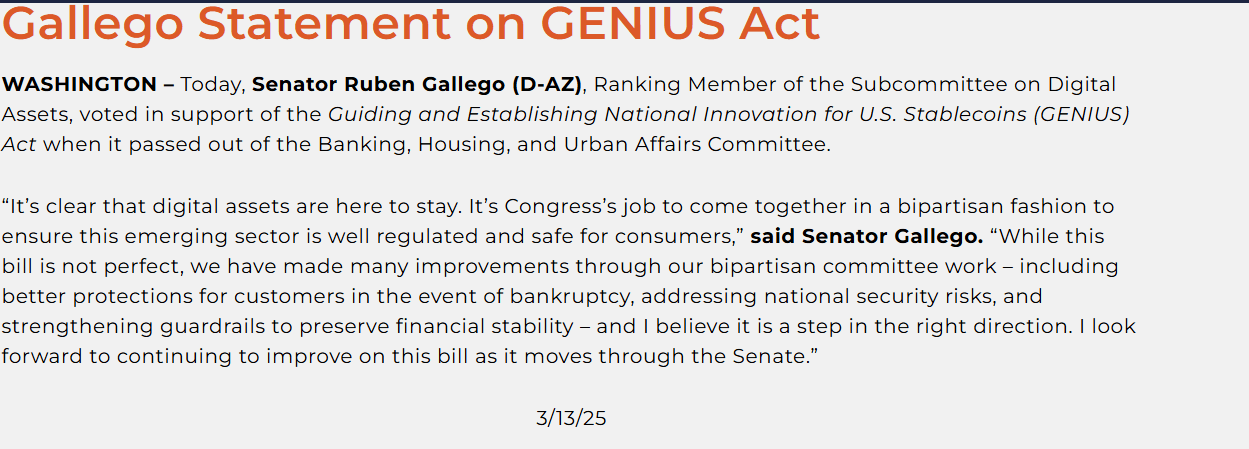
On Saturday, nine Senate Democrats (including Gallego) released a statement citing several unresolved issues in the bill.
They expressed concerns over key areas, including anti-money laundering provisions, oversight of foreign issuers, national security implications, and financial accountability. These lawmakers warned they “would be unable to vote for cloture,” essentially halting the bill in its tracks if brought to the Senate floor in its current form.
What’s striking? Four of the nine Democrats who signed the statement had previously voted in favor of the measure when it cleared the Senate Banking Committee in March. Notable signatories include Ruben Gallego (Ariz.), Mark Warner (Va.), Lisa Blunt Rochester (Del.), and Andy Kim (N.J.).
Why the Change of Heart?
A lot has shifted since March (apparently). One factor complicating this debate is the Trump family’s growing connection to the digital asset industry.
President Donald Trump’s sons are planning to launch a stablecoin through their recently started crypto firm. This has raised red flags for several lawmakers who fear potential conflicts of interest.
Additionally, Republicans had hoped that changes made to the bill would smooth its path to bipartisan support. These updates were intended to address Democratic concerns, but Saturday’s statement suggests they didn’t go far enough.
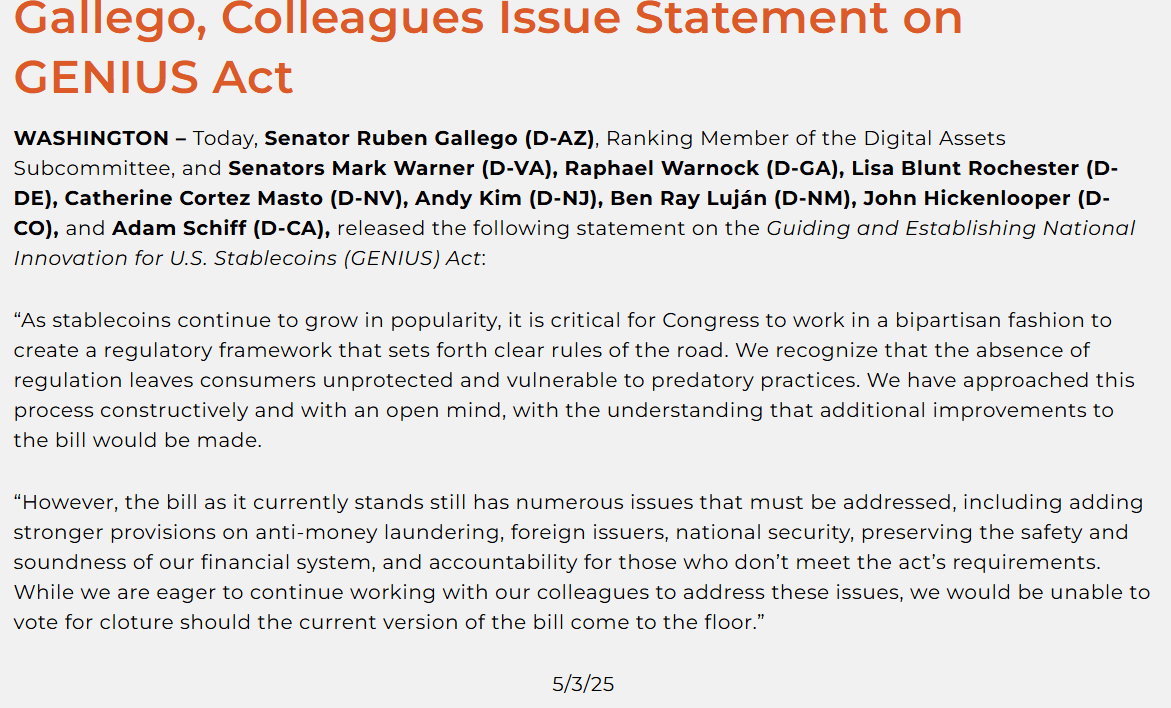
The Democrats’ statement calls for stronger measures in several areas:
- Anti-Money Laundering (AML): Clearer rules to prevent illicit financial activity.
- Foreign Issuers: Stricter oversight of companies based outside the U.S.
- National Security: Addressing potential risks related to foreign influence and cyber threats.
- Accountability: Ensuring stablecoin issuers meet strict financial requirements and are held responsible if they don’t.
- Financial System Integrity: Safeguarding stability and trust in traditional financial systems.
Democrats now hold leverage to extract additional concessions before a floor vote, but this could also create delays in the legislative process.
What’s at Stake?
For the crypto industry, the stakes are high. Passing this bill would represent a historic win for proponents of digital currency, allowing them to operate under a clear, federally approved framework. This could boost confidence in cryptocurrencies and encourage further investment and innovation.
Failure to pass the legislation, however, could delay much-needed clarity for stablecoin issuers, leaving them to operate in a murky regulatory environment. For you, as a new or aspiring crypto user, that means continued uncertainty around how these tokens are regulated.
From the Senate’s perspective, this disagreement could sow deeper divisions between Democrats and Republicans over how to handle the future of digital finance.
Some view this debate as a symptom of broader concerns about balancing innovation with consumer protection and national security. This is what Senator Gallego said this morning on his official X account:
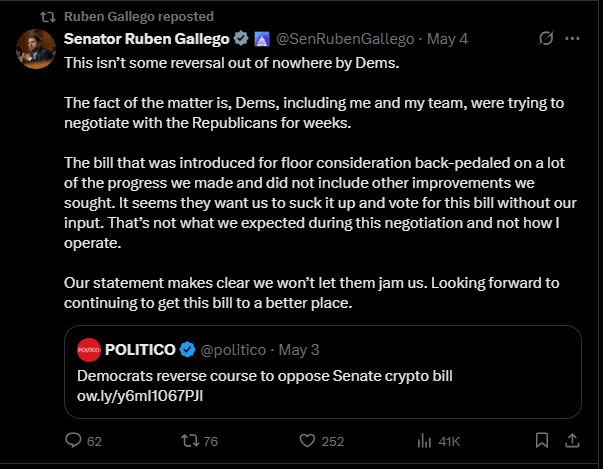
Still, the bill seemed to be on cruise control. Why now, at this exact moment? Because politics. That’s why.
After the unfortunate veto in Arizona, we shouldn’t have let this one catch us off guard. But it appears that this bill is going to turn into a battle between the parties.
What Does It All Mean for Crypto Users?
This debate underscores the challenges of regulating an industry as fast-moving and complex as cryptocurrency. If you’re new here, know that stablecoins are a critical piece of the crypto puzzle. They make transactions more…well… stable and accessible. However, they require guardrails to protect users and the broader economy.
A well-designed regulatory framework could benefit everyone, offering peace of mind for you as a user and opening up new opportunities for innovation. However, hasty or poorly crafted laws could stifle progress or fail to address key risks. The stablecoin bill has to be right, as it will be the first of its kind.
And Now We Wait…
The Senate is expected to begin considering the bill in the coming days, with the first procedural vote likely next week. If the bill fails to gain sufficient Democratic support, it could be sent back for further revisions or shelved altogether.
For now, keep an eye on whether the two sides can reach a compromise. Their ability to collaborate could shape the future of digital assets in the U.S. — and impact how you engage with crypto moving forward.
To Chill or Not to Chill on the Stablecoin Bill?
Maybe that was a bit too corny. Whatever. We aren’t poets.
The stalled progress of the stablecoin bill might seem like a setback. It is. And it isn’t. This is politics. If you’re a crypto user in a state that one of these Congresspeople represents, it’s time to start making calls and sending emails.
This is a chance for blockchain users to watch history unfold. Understand the implications of this legislation. Take action as an American voter.
Or. Just chill. Watch how it all plays out and roll with the punches as they come. Either way is neither right nor wrong. But knowledge of what’s happening in the world around you and in Washington can and will affect your bags. Be mindful.






